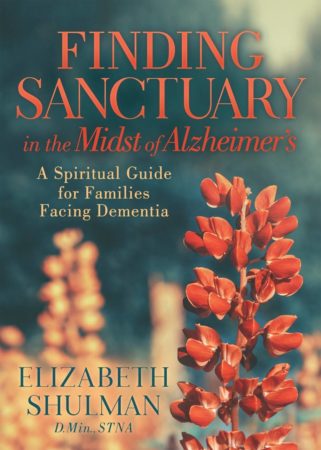 Over the past two decades, caregivers have lamented that their churches are not as engaged with them once their loved one becomes ill and needs help. They feel neglected and forgotten. While some churches do have active ministries to help caregiving families care for loved ones with dementia, many do not.
Over the past two decades, caregivers have lamented that their churches are not as engaged with them once their loved one becomes ill and needs help. They feel neglected and forgotten. While some churches do have active ministries to help caregiving families care for loved ones with dementia, many do not.
Elizabeth Shulman, D.Min., aims to strengthen church engagement with family caregivers in her book, Finding Sanctuary in the Midst of Alzheimer’s—A Spiritual Guide for Families Facing Dementia. In her three-part guidebook, she offers a spiritual path for churches and caregivers for parents and spouses. Church members who desire to help as part of their ministry are encouraged to take a 115-question self-assessment. This assessment will help them determine the “gifts” they can share with caregivers for parents and spouses.
While not a fan of self-assessments, I took this one. Caregiving was one of my higher-scoring gifts. Meanwhile, caregivers are also urged to inventory their needs and to ask for what they need. Shulman notes that many do not know what caregivers need and caregivers are hesitant to ask for help.
In Finding Sanctuary, Dr. Shulman seeks to match church members’ gifts and caregiving families’ needs. Each party has the responsibility to come forward. Shulman’s guide makes it possible.
Each of the three parts of Finding Sanctuary features quotes from scripture with examples from Shulman’s experience working with families.
While she writes from a Christian perspective, readers of different faiths and spiritual practices will derive benefit from her universal message: People come together—those who want to serve with those who have a need.
Highlights include—
- In “Finding Sanctuary for Spouses,” Shulman shares the same passage expressed in three different versions of the Bible. I found the differences eye opening. Raised with the King James version that I find awkward to read, the New International Version, seemed easier to digest. (Here are other editions of the Bible per Cambridge University Press.) [TCV Update 11/29/2023: URL updated.]
- Surprisingly, one area could have been strengthened given her years of experience working with families. She could have given caregiving spouses more specific and implementable examples regarding marital commitment in the “Ways to Express Commitment” chapter.
- Shulman’s one sentence in “A Final Word” is spot on: Remember, providing care for someone with dementia is not about being logical; it’s about providing assurance. While it is frustrating for the caregiver, it’s important to remember that a person with dementia asks a question twenty times because they forget. Shulman encourages caregivers to reply as if the question was asked for the first (and only) time.
- In the same chapter, she writes of losing friends while caring for one with dementia. People feel uncomfortable because they don’t know what to say. Shulman suggests that we tackle our own insecurities. When we change the way we view things, we can gain confidence. For example, instead of feeling we must know how to do something, we can choose to learn something about ourselves while visiting a person with dementia.
A meta-review note…  The Caregiver’s Voice REVIEW receives many books throughout the year. Author, Elizabeth Shulman, felt enough pride in her work to package it with attention to detail. We received her loving gift in a box with the book nested in a bed of shredded paper, with her business card, a handwritten letter, and dried foliage on top.
The Caregiver’s Voice REVIEW receives many books throughout the year. Author, Elizabeth Shulman, felt enough pride in her work to package it with attention to detail. We received her loving gift in a box with the book nested in a bed of shredded paper, with her business card, a handwritten letter, and dried foliage on top.
The matte finished book, short chapters, and easy-to-read print made for welcome reading.
A final comment on one detail… In tiny print on the lower left of the back cover is a clock and the words, “Read Time: 68 minutes.” The 133-page book took me far longer to read, savor, and digest. It’s your choice. You can either skim and glean the surface message or dive deeper and be touched by an author’s words.








